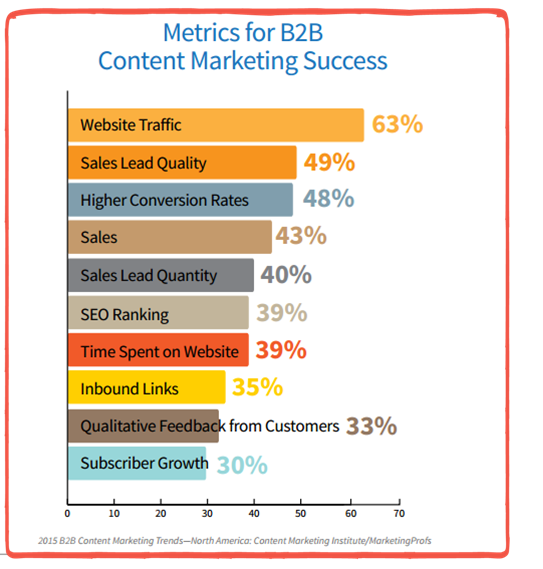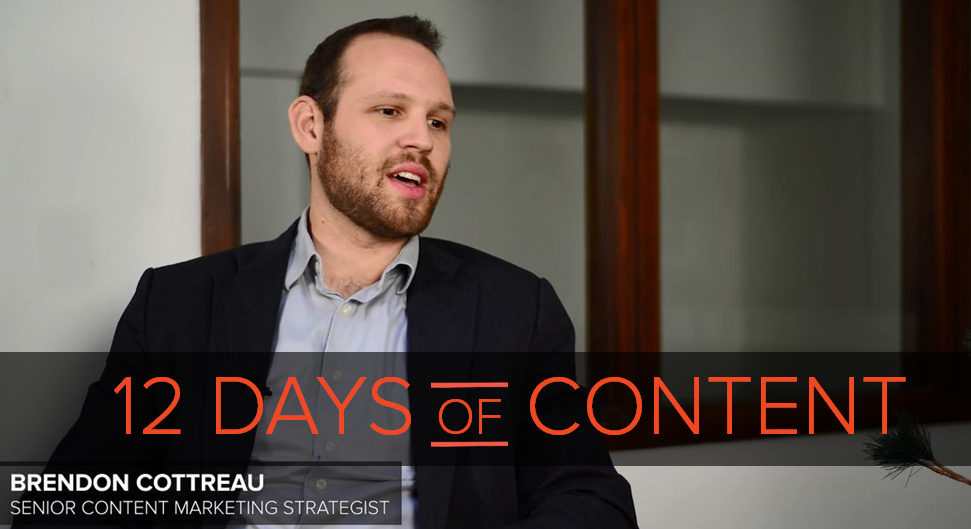Why do you invest in content marketing? In 2014, the top reason was website traffic. That’s largely still the case and web content is an effective way to attract more visitors through organic search.
Click play to watch the interview with senior content marketing strategist Brendon Cottreau about how to build content strategies that match your goals, and read the full blog post for additional insights.
Content Marketing Institute data shows 63 percent of marketers cite traffic volume as the primary metric that indicates their strategies are successful.
Content marketing took hold as a way to fuel SEO, but companies are beginning to see that content can also fuel other important business objectives, such as:
- Brand awareness
- Engagement
- Thought leadership
- Trust
- Lead generation
- Sales
Start with your goals
To kick off our 12 Days of Content series, we wanted to start with using goals to direct your content strategy – something our teams urge marketers to do every day. Goals should be at the heart of any strategy, and we’ve seen firsthand that brands with solid aspirations are more likely to achieve them than businesses running ad-hoc campaigns hoping to strike gold along the way.
According to Senior Content Marketing Strategist Brendon Cottreau, “The main goals I hear from marketers are: Generating visibility for their brands and increasing qualified leads through their websites.”
“Along with those come a number of supporting goals, such as driving social engagement, increasing inbound links and developing content for nurture campaigns,” he added.
It’s great that marketers are coming to expect more from their content search rankings and traffic. We have to wonder if a lot of marketers cited traffic as the top KPI simply because it’s the most most straight-forward to measure against. Traffic will always be an essential top-of-funnel metric, but there are smart ways to use content analytics data to track results for more elusive goals like engagement and lead influence.
Establish your key performance indicators (aka signs of success)
After you’ve determined the prioritized goals of content, establish clear KPIs to measure against – what does engagement look like to you? Does a resource download count as a content conversion? What percentage growth in new visitors counts as successful brand awareness?
There are smart ways to use content analytics data to track results for more elusive goals like engagement and lead influence.
A strong analytics setup lets you monitor how the strategy is contributing to success across a range of goals. You can then use that data to make modifications to your campaign to achieve the results you need to see.
Build a strategy to make those goals happen!
Once you know your goals and how you want to measure them, you can start to build a content calendar that supports those objectives and targets the results most important to you.
Here are some examples:
1. If you’re looking to drive traffic:
Create quality content that people are going to be interested in and are actively seeking online. Think searchability. Craft headlines around the phrases people would use to find you at the very top of the sales funnel, when they are just starting to research a pain point.
In your content, talk about key themes that are important in your industry, and offer unique value through your brand’s own spin. These details will bring people to your site and educate them about your brand.
2. If you’re looking for lead generation:
Start to build an archive of high-value resources, such as white papers, eBooks, infographics and even some videos that you can put behind a download wall. This is where you want to provide in-demand answers that people want to access and can’t find anywhere else. The content you’re sharing needs to be premium if someone is going to hand over their contact information to see it.
For more specifics on content strategies to fuel other goals, get in touch with a member of our team.
Content marketing is king because it’s versatile. You’re selling your strategy and your business short if you don’t set your eye on a prize bigger than traffic BEFORE you post. Smart marketers are turning content into the resources they know their customers need and using metrics to measure how the impact their strategies have on the bottom line.
Check back for more answers in our 12 Days of Content!



